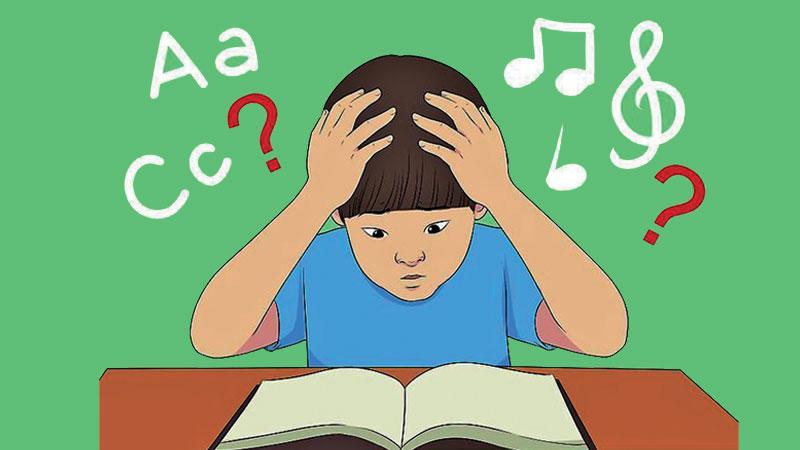
The National Joint Committee on Learning Disabilities has defined learning disability as ‘a heterogeneous group of disorders manifested by significant difficulties in the acquisition and use of listening, speaking, writing, reasoning or mathematical abilities’.
Usually medical trainers use terms such as mentally handicapped, mental retardation or brain damage, etc., to describe this disability and people get confused with these terms since they do not understand the symptoms or the causes of learning disability. Furthermore, people get confused with the words, learning disability, learning disorder and learning difficulty. Yet all three are different from one another. Learning disorders refer to significant learning problems in academic areas and the most common types are dyslexia (reading), dyscalculia (mathematics) and dysgraphia (writing). Learning difficulty is the result of having visual and hearing issues, motor handicaps, intellectual disability, emotional disturbances, environmental concerns, cultural problems and economic disadvantages.
Learning disability is a clinical diagnosis which an individual encounters in performing specific skills or completing given tasks. It is a developmental issue that presents from early childhood and children with learning disability are not able to learn as other children. Learning disability doesn’t only affect the academic learning, but also other areas such as self-care skills, communication skills and life skills such as, managing money and day-to-day activities.
Learning disability
They may struggle in maintaining relationships with others. Nevertheless, these difficulties are not noticeable in some children from their birth. Learning disability can be caused due to heredity and genetics, problem during pregnancy and birth and during delivery or accidents after birth.
This is often determined by the pediatrician, psychiatrist and various professional psychologists such as clinical, counselling, neuro and school through intelligence testing, academic achievement testing, classroom performance, and social interaction and aptitude tests. Nearly 3% of the population suffer from learning disability and it is more common among boys than girls.
It is important to know the level of seriousness which might help you to provide some guidelines to take care of a child with disability. There are four types of learning disability based on the level of seriousness: mild, moderate, severe and profound.
Children with mild learning disability will not show any physical difference and would look like other children who do not have learning disability. They are often able to communicate properly and understand others’ conversations. These children can be completely independent in self-care such as eating, washing, dressing and toilet training.
Need regular support
Children with moderate learning disability need regular support from their family. Their level of understanding verbal communication is low, however they are able to use sign language or other communication types such as, pictures. They can be independent in some parts of their self-care, but need others to remind and motivate them in carrying out those activities. Females need additional support from their family to maintain their hygiene especially during menstruation. They may be able to learn limited academic skills, but may find non-academic tasks much easier, such as, music, dancing and drawings.
Children with severe learning disability need extensive support in all areas in their lives, from their family. They have limited communication skills and know few monosyllabic words. They may not be able to look after themselves in self-care.
Children with profound learning disability need help all the time. It can be difficult for those with profound learning disability to live a normal life. They need continuous support from their family. They are unable to speak and communicate with others, and often have physical disabilities and find it difficult even to walk.
It is important to keep in mind that learning disability cannot be cured, but it is not contagious. It is a lifelong challenge and cannot be cured within the lifetime. With appropriate intervention and support, children with learning disability can achieve success in school, during adulthood, at the workplace, in relationships and in society. There is no medication that can cure or improve learning disability. Some medical trainers use medication to treat the secondary social and psychological problems that some children with learning disability have.(For example, medications to calm down difficult behaviour, such as anxiety or depression, or help a child to concentrate or sleep). In general, medication helps with this disability.
Special education methods
It is better to consider various other methods to help children with learning disability. They can be given special education methods, including direct instructions from the teachers, comfortable classroom adjustments, special learning equipment and additional classroom assistants.
The effects of having learning disability can be extended to personal and social problems too. Children with learning disabilities experience various stigmatizing labels. Teachers usually don’t have positive expectations on their academic knowledge and this has made them to show lower performance during school. In some cultures, children with learning disability have been considered as bad luck or a curse. Most families try to hide these children or hide their inabilities from society.
These children have been exposed to discrimination and exploitation in society. Lack of knowledge on such psychological disabilities seems to be the reason for society to show such degraded behaviour. Counselling guidance for such children’s parents is necessary. Early remediation can minimize the difficult behaviours of children with learning disability, and guidance on social isolation and handling difficult behaviours need to be provided.
Though we cannot make learning disability disappear from a child, we can still help a child live a happy and rewarding life despite the disability. In fact, when we think of children with learning disability, the first thing that comes to mind is their disability. However, it is better to remember that they are also like other children who have equal opportunities in every area. They have different personalities, interests, strengths and weaknesses, likes and dislikes. Irrespective of their disability, one should respect and treat them as individuals.
(The writer is a Psychological and PhD Candidate – UOC)
